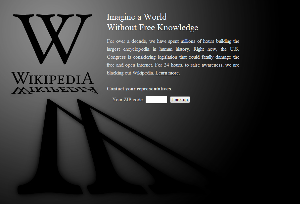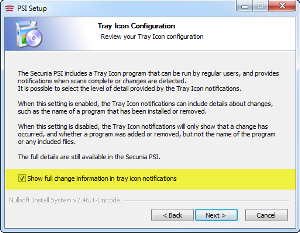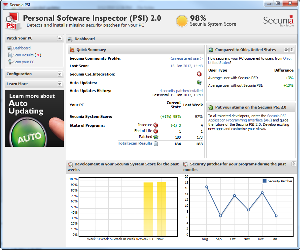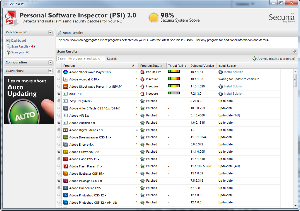SOPA/PIPA: The Right Way to do the Wrong Thing
Or vice versa. OPINION: At the risk of being accused of engaging in politics, I feel that it's important to say that SOPA (the Stop Online Piracy Act) and PIPA (the Protect IP Act) are ill-concieved and badly written pieces of legislation that virtually anyone who knows anything about the Internet is opposed to. In an attempt to make this a top-of-mind issue for more people and to encourage opposition to a bill crafted not by members of Congress but by the movie and music industries, Wikipedia and Google (among others) this week highlighted the legislation. This really isn't a conservative versus liberal, Republican versus Democrat issue: The bills both had support and opposition from all sides of the political spectrum.
 Visit Wikipedia in English and, instead of millions of articles, you get just one. It's true that pressing Esc or disabling Javascript allowed users to search Wikipedia but the alert page doubtless alerted millions of people to what could happen if this legislative monstrosity ever manages to become law. Wikipedia even explained the workarounds: "During the blackout, Wikipedia is accessible on mobile devices and smart phones. You can also view Wikipedia normally by disabling JavaScript in your browser.... Our purpose here isn't to make it completely impossible for people to read Wikipedia, and it's okay for you to circumvent the blackout. We just want to make sure you see our message."
Visit Wikipedia in English and, instead of millions of articles, you get just one. It's true that pressing Esc or disabling Javascript allowed users to search Wikipedia but the alert page doubtless alerted millions of people to what could happen if this legislative monstrosity ever manages to become law. Wikipedia even explained the workarounds: "During the blackout, Wikipedia is accessible on mobile devices and smart phones. You can also view Wikipedia normally by disabling JavaScript in your browser.... Our purpose here isn't to make it completely impossible for people to read Wikipedia, and it's okay for you to circumvent the blackout. We just want to make sure you see our message."
 Google still worked as expected but the site called attention to the proposed laws and asked visitors to tell Congress not to censor the Internet. The Mozilla Foundation and many other high-profile organizations have stepped up to oppose SOPA.
Google still worked as expected but the site called attention to the proposed laws and asked visitors to tell Congress not to censor the Internet. The Mozilla Foundation and many other high-profile organizations have stepped up to oppose SOPA.
SOPA is the House's version of the bill. PIPA (the Protect IP Act) is the Senate's version. These bills probably would reduce piracy but they would force website owners to prove their innocence instead of depending on prosecutors to prove guilt. Does that seem just a little bit un-American to you? All power would be handed over to the big media companies at the expense of the Internet and its users. (Users = You and me.)
Let me be clear: Nobody is making a case for piracy.
I won't shed a tear if somebody shuts down Pirate Bay. But I would like to see start-ups like YouTube succeed. Today YouTube is big enough to survive on its own but if SOPA and PIPA had been the law of the land in YouTube's early days, the service would have been killed. If somebody posts copyrighted material to YouTube, the service removes it as soon as it becomes aware of the problem. The movie and music industries would have services such as YouTube shut down permanently if even one bad actor posted illegal material.
Wikipedia explains it this way: "SOPA and PIPA would put the burden on website owners to police user-contributed material and call for the unnecessary blocking of entire sites. Small sites won't have sufficient resources to defend themselves. Big media companies may seek to cut off funding sources for their foreign competitors, even if copyright isn't being infringed. Foreign sites will be blacklisted, which means they won't show up in major search engines. SOPA and PIPA would build a framework for future restrictions and suppression. In a world in which politicians regulate the Internet based on the influence of big money, Wikipedia — and sites like it — cannot survive."
Google: "Two bills before Congress, known as the Protect IP Act (PIPA) in the Senate and the Stop Online Piracy Act (SOPA) in the House, would censor the Web and impose harmful regulations on American business. Millions of Internet users and entrepreneurs already oppose SOPA and PIPA."
Reddit: "Today, for 12 hours, reddit.com goes dark to raise awareness of two bills in congress: H.R.3261 'Stop Online Piracy Act' and S.968 'PROTECT IP', which could radically change the landscape of the Internet. These bills provide overly broad mechanisms for enforcement of copyright which would restrict innovation and threaten the existence of websites with user-submitted content, such as reddit."
The acts aren't supported or opposed by one party or the other. Barbara Boxer (D, Senate, California) supports the legislation as does Sherrod Brown (D, Senate, Ohio) while Michelle Bachmann (R, House, Minnesota) and Nancy Pelosi (D, Senate, California) oppose it. It's more a question of those who understand technology and those who are clueless—and have to admit that placing Boxer and Brown among the clueless while Bachmann and Pelosi are among the clueful—surprised me more than a little. So if this were a political issue, I'd be telling you that we should all stand behind Barbara Boxer and Sherrod Brown. Instead, I'm saying that these two politicians don't have a clue. Somehow Michelle Bachmann and Nancy Pelosi ended up on the same (right!) side of the issue. Go figure.
Two groups that have been fighting PIPA, SOPA, and their predecessors for more than a year are Demand Progress, a left-leaning organization that is run by David Segal -- a former Democratic Rhode Island state representative and candidate for Congress, and Don't Censor the Net, a right-leaning organization that is run by Patrick Ruffini who was the webmaster for George W. Bush's re-election campaign and former new-media director for the RNC.
If you find the Internet useful, whether for looking up information on sites such as Wikipedia or enjoying the antics of cats on ICanHazCheeseburger, you should be opposed to this bad legislation. Now is the time to let your Senators and Representatives know how you feel.
Oh ... and here's a pretty good explanation of SOPA/PIPA: http://theoatmeal.com/sopa/.
At the Close of the Week
By the end of the week, Congress was backing down. As Jonathan Weisman, reporting for the New York Times put it, "As a result, the legislative battle over two once-obscure bills to combat the piracy of American movies, music, books and writing on the World Wide Web may prove to be a turning point for the way business is done in Washington. It represented a moment when the new economy rose up against the old."
The old economy: K Street lobbyists, the US Chamber of Commerce, the Recording Industry Association of America, the Motion Picture Association of America, and such.
The new economy: Wikipedia, Google, Facebook, Twitter, Reddit, Wired, thousands of smaller Internet concerns, and "citizens of the Internet" (netizens).
Two bills that once had wide bipartisan support are seeing sponsors quickly disassociate themselves with the legislation just as big registrar GoDaddy flipped from supporting the bills to being neutral on them and then flopped to oppose the bills.
The MPAA's website blusters against the opposition, possibly in part out of embarrassment. The studios have been pressing congress to act against offshore websites that serve unlicensed copies of movies and now, after 4 years of making claims such as "piracy costs as many as 100 thousand jobs per year" they've seen their over-reaching bills go down in flames.
Note the weasel words in the claim: "as many as". That sentence would be true if piracy costs 100 jobs per year, or even 1. I would like to see research by an independent auditor to support those claims.
I can't think of anyone who questions the existence of a piracy problem because factories in China, Russia, and elsewhere turn out cheap knock-offs of US movies, music, and books. But the laws, as written, would (accidentally or intentionally) have done irreparable harm to the Internet.
In his New York Times article, Jonathan Weisman, summarized the situation well: "And for all the campaign contributions, Washington parties and high-priced lobbyists the old economy could muster, nothing could compare to the tentacles the new economy can reach into Americans' everyday lives through sites like Wikipedia. Aides to Senator Harry Reid, the majority leader, say he will press forward with a vote Tuesday to open debate on the Protect I.P. bill. Negotiators from both parties are scrambling for new language that could assuage the concerns of the Internet community, but expectations are that the bill will now fail to get the 60 votes to move forward — a significant setback."
Keeping Your Computer Up to Date
On last week's program I mentioned the Secunia Personal Software Inspector and this week I'd like to tell you more about this free utility program. When I installed it and allowed it to scan my primary computer, I expected to find no problems. Oops. Although I earned a high score (91%) PSI still found some problems. If security and having up-to-date applications (which is a function of security) are important to you, check out the Secunia website and the free Personal Software Inspector.
The installation process is easy enough but let's take a look at some of the options.
 You have just 3 decisions to make and if you later change your mind you can modify the configuration settings. The first two decisions are on the Auto-Update Configuration screen.
You have just 3 decisions to make and if you later change your mind you can modify the configuration settings. The first two decisions are on the Auto-Update Configuration screen.
- I selected the option to allow automatic program updates. When enabled, the Secunia PSI will continuously monitor if insecure programs that can be auto-updated are detected on your PC and automatically download and install the suggested security patches on your PC.
- And, although I like the idea of automatic updates, I also want to know what the application has in mind so I also selected prompt before running automatic program updates. When enabled, an approval icon will appear in the Scan Results if a program is about to be updated. The update will not start until the approval icon is clicked.
 The final decision is requested on the Tray Icon Configuration screen.
The final decision is requested on the Tray Icon Configuration screen.
- Because I like to know what an application such as this has accomplished, I selected show detailed program changes. If this setting is enabled, the Secunia PSI Tray Icon will show detailed information when program changes are detected and it includes the names of changed programs. If this setting is disabled, the Tray Icon will only show that changes occurred, without giving any details about what program changed.
 Secunia PSI told me the operating system was up to date. Most of the applications were up to date. Most. Not all. That was a surprise.
Secunia PSI told me the operating system was up to date. Most of the applications were up to date. Most. Not all. That was a surprise.
- Adobe Audition 3.0: I've updated to Audition CS5.5 so this needs to be removed.
- Shockwave Player 10.x: Version 11 is available so I had PSI download it.
- Flash Player10.2 has been updated to 10.3. Downloaded and installed.
- Shockwave Player (again): Updated.
- Apple Safari. I don't use it but a new version is available. Installed.
- Firefox: It seems that 3.6 and 10.0 are both installed. Removed 3.6.
- IrfanView: New version available. Installed.
- Thunderbird: I don't use it (except for testing) but I updated it.
- Opera: Updated to 11.6.
- Winamp: Updated to 5.623.
- Net Framework updates are from Microsoft. Installed.
 After this round of updates my score had increased from 91% to 98% but Adobe Shockwave Player 10.x was still shown as "end of life" even though I had updated it 3 times. Microsoft Net Framework still showed "insecure" even though the Microsoft Updater said everything was up to date and I had installed the Net Framework updates. And cURL was still listed although it is a component of the Alien Skin Wingnut Lo-Fi application.
After this round of updates my score had increased from 91% to 98% but Adobe Shockwave Player 10.x was still shown as "end of life" even though I had updated it 3 times. Microsoft Net Framework still showed "insecure" even though the Microsoft Updater said everything was up to date and I had installed the Net Framework updates. And cURL was still listed although it is a component of the Alien Skin Wingnut Lo-Fi application.
- For Shockwave I suppose that I could install the update a fourth time but I suspect that won't be any more successful than the first 3 times. Two Shockwave entries existed in the Windows uninstaller dialog so I removed both and then installed the same 11.6 version that I had downloaded and installed 3 times previously. Secunia PSI still thinks that version 10.1 is still on the computer although it's been removed and it still claims that 11.x is still insecure even though I have installed the most current version 4 times.
- Net Framework is up to date no matter what PSI thinks.
- That leaves cURL, which I believe is not in any way associated with the application that happens to use a file with that name. Secunia has simply misinterpreted a file named "curl.exe" that's part of another application with "cURL.exe", which is a secure file transfer application that I don't use.
So the lesson here is not to take any automated process at face value. If what an application tells you seems like nonsense, maybe it is nonsense.

 Secunia PSI keeps your computer up to date and may keep you just slightly confused.
Secunia PSI keeps your computer up to date and may keep you just slightly confused.
Secunia PSI is a worthwhile, useful application but it's important to treat it the same way you would treat any other sooth-saying fortune teller. Treat the report with skepticism. Act on reasonable suggestions. Forget the rest.
For more information, visit the Secunia website.
Short Circuits
Bankruptcy for Kodak
We've known this was coming but it was still a sad day when the once mighty Eastman Kodak Company filed for bankruptcy protection. Kodak is filing for Chapter 11 protection, listing assets of $5.1 billion and debts that total $6.8 billion.
The company owns thousands of patents pertaining to digital photography but has been unable to sell them.
Kodak did many things right in realizing that digital photography would forever change the way we create and share images but was unable to capitalize on its attempt to transition from being "the film company" to being "the picture company". The fact that most people create far fewer prints today than they did in years past didn't help. Nor did the fact that Kodak managed to bring to market some of the worst digital cameras ever seen.
Kodak's CEO Antonio M. Perez said that bankruptcy "is a necessary step and the right thing to do for the future of Kodak." It is, in fact, the only way the company might survive.
Kodak has been around for 130 years but since the advent of digital imaging the company's market value fell from $31 billion to $150 million. Since 2003 Kodak has closed 13 manufacturing plants and 130 processing laboratories, and cut its workforce by 47,000. Kodak now employs 17,000 people.
Kodak has not been profitable since 2007.
By mortgaging all of its properties, Kodak has a $950 million loan that lasts for 18 months. During that period, the company hopes to find a buyer for its 1100 patents. In 1930, Kodak was added to the Dow Jones Industrial Average market indicator. In 2004, the company was delisted. Since then, it's been a long, slow downhill ride.
Kodak has been suffering for the past 40 years. Founded in 1880 by George Eastman, Kodak became the American photography company but Japan's Fujifilm entered the US market around 1980 with films that reproduced greens better than Kodak's films and digital imaging brought an end to Kodak's film and chemistry business.
After 17 Years, Yang Leaves Yahoo
Yahoo co-founder Jerry Yang rode the Web portal business to its zenith and watched as mistakes nearly destroyed the company. Now he's announced that he will resign from Yahoo's board, the board of Yahoo Japan, and the board of Alibaba Group Holdings, which is owned in part by Yahoo.
In the end it was complaints and questions about conflicts of interest that resulted in Yang's decision. Besides being a co-founder, Yang is a director, owner of a lot of the company's stock, and former chief executive. Following his resignation, Yahoo stock rose about 3%.
Earlier this month, Yahoo hired former PayPal president Scott Thompson as CEO to replace Carol Bartz who was named CEO in 2009.
Yang said only that he made the decision on his own, that it was time for him to pursue other interests, and that he had nothing else to say.
Although Yahoo was an early leader among Internet companies, it has been eclipsed by companies such as Google and Facebook. Overall, though, it was a pretty good ride for Yang and David Filo, the other co-founder. Yang and Filo together made a fortune from the company that started as a hobby when they were students at Stanford.
Now Playing at Netflix: Getting Sued
It's as easy as 1-2-3: (1) Price hikes and an ill-advised decision (quickly rescinded) to split Netflix into two companies. (2) Plummeting stock value because of #1. (3) Now a class-action lawsuit because of #2.
As surprise endings go, this isn't one. A group of investors in California has filed suit against "Netflix and certain of its officers and/or directors". The suit, in US District Court, alleges that company insiders concealed negative trends and sold their own stock at a time when they knew trouble lay ahead.
Netflix CEO Reed Hastings, Chief Content Officer Ted Sarandos, and Chief Marketing Officer Leslie Kilgore are among those named in the suit. Last July Netflix announced that it would split the DVD service (and rename it "Qwikster") from the streaming service (which would retain the "Netflix" name). At the time, Netflix stock was valued at nearly $300 per share. A few months later, after Netflix had lost nearly 1 million subscribers, its stock was selling for $77. The price has recovered partially to about $100 now.
The suit covers actions taken between July 12 and October 25 of last year, a period during with the defendants are accused of making false and misleading statements. Those named in the suit sold a combined total of nearly 400 thousand shares of stock valued at about $90 million.
What is that on Your Shoe?
Online shoe retailer Zappos is being sued by a customer who's annoyed by a data theft that the company notified its customers about. Personal data from 24 million accounts could have been compromised. That creates the potential for a lot of unhappy people. The company is owned by Amazon.com. Does this call into question Amazon's data security? If not, it should.
Zappos says that names, e-mail addresses, billing and shipping addresses, phone numbers, the last four digits of credit card numbers, and encrypted versions of account passwords were likely compromised. The most critical problem, then, is the password problem. A lot of people use the same e-mail address and password for lots of accounts, including bank accounts. So this isn't a small problem. Of course, one could easily make a case that anyone careless enough to use the same user name and password for a bank account as they did for an account with a shoe retailer is simply asking for trouble. It's also important to note that the passwords were encrypted.
If there is good news it is that Zappos says credit card numbers and other payment information remained secure because they are maintained in a different database. Zappos reset all customers' passwords but also turned off the phone lines to its support staff. So if you're a customer with a question, you'll have to contact the retailer by e-mail.
Meanwhile, back at the ranch, attorney Mark Gray filed suit in federal court at Louisville on behalf of Zappos customer Theresa D. Stevens, of Beaumont, Texas. The geography of these class-action suits, which is what Gray wants this to become, is more than a little puzzling. Zappos is located in Henderson, Nevada. The aggrieved customer is in Beaumont, Texas. So of course the attorney, who is from Louisville, has filed suit there. The Zappos fulfilment center (aka "warehouse") is located in Shepherdsville, Kentucky.



 The author's image: It's that photo over at the right. This explains why TechByter Worldwide was never on television, doesn't it?
The author's image: It's that photo over at the right. This explains why TechByter Worldwide was never on television, doesn't it?
